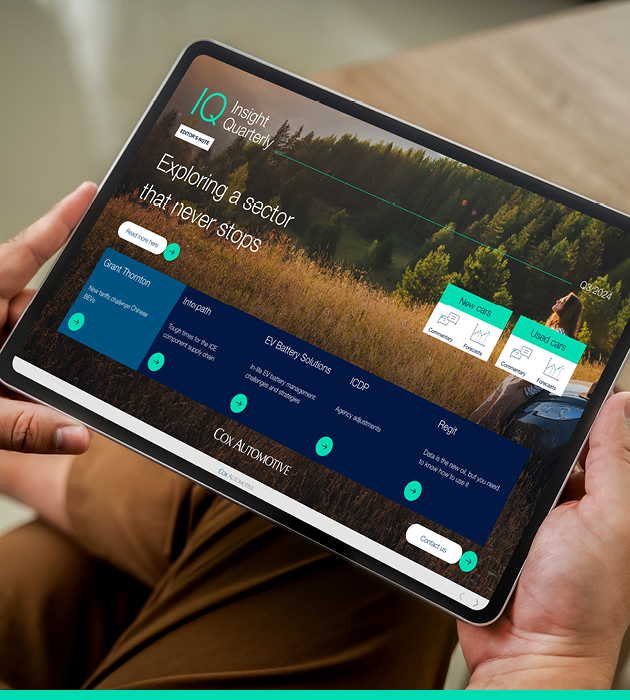Helping you stay informed about the industry’s most important trends & topics.
Discover Insight Quarterly.
Ensuring the longevity and responsible repair, remanufacturing, refurbishment, repurposing and recycling of batteries is crucial to wider EV adoption – according to Cox Automotive’s Karoline Baumann.
That was one of many issues pondered by a FT Future of the Car panel discussion entitled “From ownership to usership – adapting to changing consumer behaviours”.
The conversation touched on the consumer need for flexibility in car ownership, the popularity of leasing, how EVs are driving ‘usership’, the importance of connectivity, and the shift in consumer attitudes, among other things.
Karoline, Strategy Director Europe, said: “We’ve had decades to master the use and management of traditional ICE vehicles. With EVs, there are many issues still to be worked out. For example, too many get written off when they might not need to because there’s a fear around the battery – how to repair, the cost, the supply chain. People who buy EVs don’t want to scrap them after a few miles because of damage to the battery. The whole ecosystem needs to come closer together to fix this.”
Asked how far the automotive shift from ownership to usership had gone, Karoline said the two are wrongly seen as standalone propositions.
“In reality, for consumers, it’s not so black and white. Of course, customers want flexible access to vehicles, but having their ‘own’ car, or what they perceive as their own, is still important. Indeed, only about 15% of people who have a car today want to completely switch to other forms of transportation and mobility in the future.
“About a quarter of people who lease don’t know who the car belongs to or wrongly think they own the car. So, there’s definitely a spectrum regarding usership and ownership, rather than two distinct customer mindsets.”
Karoline was joined on the panel, moderated by FT Transport Correspondent Philip Georgiadis, by Laurent Floquet of Allianz Partners, Mike Johnstone, formerly of Group Lotus and Scott Nash of Verizon Business Group.
She insisted that customers are, on the whole, still drawn towards traditional ownership models, but EV adoption is changing that.
“With EVs, customers are twice as likely to consider usership models. That stems from a “try before you buy” mentality and uncertainty around residual values. Buyers want to know what it feels like to own an EV before they buy one and they want someone else to carry the risk.”
Scott Nash of Verizon Business Group thinks EVs, with their longer lifespan compared to ICE, have the added burden of having to ‘delight’ the next generations of buyers.
He said: “Connectivity is crucial. You won’t be able to delight the next generation without allowing them to download the new feature set.
“What I’m buying today will not energise successive generations to buy because so much will have changed in technology. Connectivity is going to be key to all that.
Laurent Floquet echoed the point, insisting that connectivity allows manufacturers to couple the driver with the car.
He said, “What do people want? They want hassle-free driving and more freedom. That’s what connectivity means.
Scott Nash added that in the same way data about a mobile phone user’s habits can be uploaded to a new handset, the same should be true of cars and will inevitably be the case.
He said, “What do people want? They want hassle-free driving and more freedom. That’s what connectivity means.”
Karoline said: “When we think about usership, a big part is making the experience hassle-free.
“Having access to technology and data that tells us driver behaviour, or to vehicle data helps fine-tune the whole customer experience. It’s about convenience at the end of the day.
The panel also discussed the changing nature of car ownership and the problems drivers face in large cities.
Karoline said: “If you’re living in a large city, are you always going to have access to charging? Probably not. Certain areas will see quicker usership uptake and deeper penetration than others.”
She emphasised the importance of having a proper physical infrastructure underlying any technological digital advancement.
“It needs to be as tailored and seamless as possible. Digital has to connect with physical. We’re still on a journey to that, and there are already players in that space. But it still needs to develop.”
Philip Georgiadis asked the panel why EVs are perhaps not being embraced as enthusiastically as the automotive industry hoped.
Karoline said: “We will see a shift when the value proposition is right for the consumer; price is more important than flexibility.
“More education is needed, as is building up the infrastructure and ensuring it meets the needs of the customer. When that happens, people will be more willing to adopt EVs—the same goes for newer forms of mobility as well.”
Start your journey
We’re transforming the operations of the world’s leading automotive brands. Get in touch to find out how.




